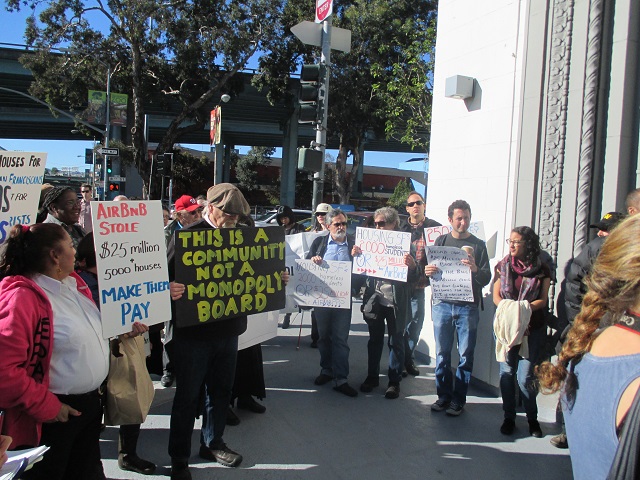Last month, at its annual meeting in Puerto Rico, the American Association of Political Consultants gave the $10M Airbnb-financed No on F campaign its award for “Ballot Measure Campaign of the Year.”
One wonders if former Sup. Julie Christensen would be so fulsome in her praise of the No on F campaign, since she closely tied herself to Airbnb, introducing a series of amendments that greatly weakened an already weak ordinance purporting to regulate Airbnb just six months before the November, 2015 election — at which she decisively lost her campaign and her seat on the board, in large part due to the vote for Prop. F in District 3.

Aaron Peskin, a strong supporter of Yes on F (he featured it on all of his window signs), handily defeated her.
Almost a year to the day after Christensen introduced legislation to weaken the city’s ordinance regulating Airbnb and other short-term rental companies, Peskin joined Sup. David Campos at a press conference featuring the ShareBetterSF (the Yes on F campaign coalition) amendment that would strengthen the city’s ability to control short-term rentals by requiring that only registered units could be displayed on the web, fining the web hosts up to $1,000 a day for each listing of an unregistered unit.
The April 2015 Christensen amendments reduced registration requirements, making it more difficult for the city to verify that the owner of a short-term rental unit was in fact the “principal resident” of the house or apartment. Most significantly, it also removed the “private right of action” that allowed non-profit tenant and neighborhood organizations to join in enforcing the law. That made that actual enforcement of the ordinance totally reliant on neighbors’ complaints — thus creating the situation of “neighbor spying on neighbor” Airbnd’s award-winning campaign falsely claimed would result if Prop.F passed.
The April 2016 Peskin/Campos amendments would go far to render Christensen amendments moot. This is not the first game changer in which Peskin has been involved since his return to the Board. In one of his first votes he stopped the below-market sale of a piece of city owned land to a market-rate housing developer offering minimal affordability. In quick order, Peskin’s vote changed a 6-5 pro-developer benefit Board to a 6-5 pro-community-benefits Board.
A key reason for Peskin’s November, 2015 victory in District 3 was the vote on Proposition F in the district. While the measure lost narrowly in D3 (49% Yes to 51% no) it was the most heavily voted-on issue, with some 17,118 total votes cast, 1,135 more than for Peskin and Christensen combined and 800 more than were cast for mayor.
In the 30 polling places in D3 (containing 45 precincts), Peskin and F won 11. Peskin won in another 10 polling places in which F lost. F won in one polling place that Peskin lost. Christensen, however won in only seven polling places where F lost, winning in only one where F won. In short, there was no “Airbnb coat tails” in D3.
Help us save local journalism!
Every tax-deductible donation helps us grow to cover the issues that mean the most to our community. Become a 48 Hills Hero and support the only daily progressive news source in the Bay Area.
Yes on F got 1,100 more votes than Christensen (Yes on F, 8,352-Chrsitensen, 7,243) while No on F got only 26 more votes than did Peskin (No on F 8,726, Peskin 8,740).
Proposition F was sponsored by a very unusual coalition: the Labor Council and the Sierra Club, the Apartment Owners Association and the Tenants Union and the Housing Rights Committee, the Coalition for San Francisco Neighborhoods and the Council of Community Hosing Organizations. These organizations had actual members and a track record over time in many communities that make up D3.
Indeed, on election day, yes on Yes on F actually won the district vote in D3 (as it did citywide). These organizations still exist and are still active in D3 long after the November, 2015 vote. And they are still together seeking amendments to the Airbnb legislation to protect neighborhoods and tenants from displacement.
Airbnb, on the other hand, had the best campaign money can buy, as attested by the AAPC award. It narrowly focused on defeating Prop F and prevailed. However, that campaign, no longer exists. Neither does Supervisor Christensen.
There is a lesson for elected officials in this story: coat-tails come from coalitions.





